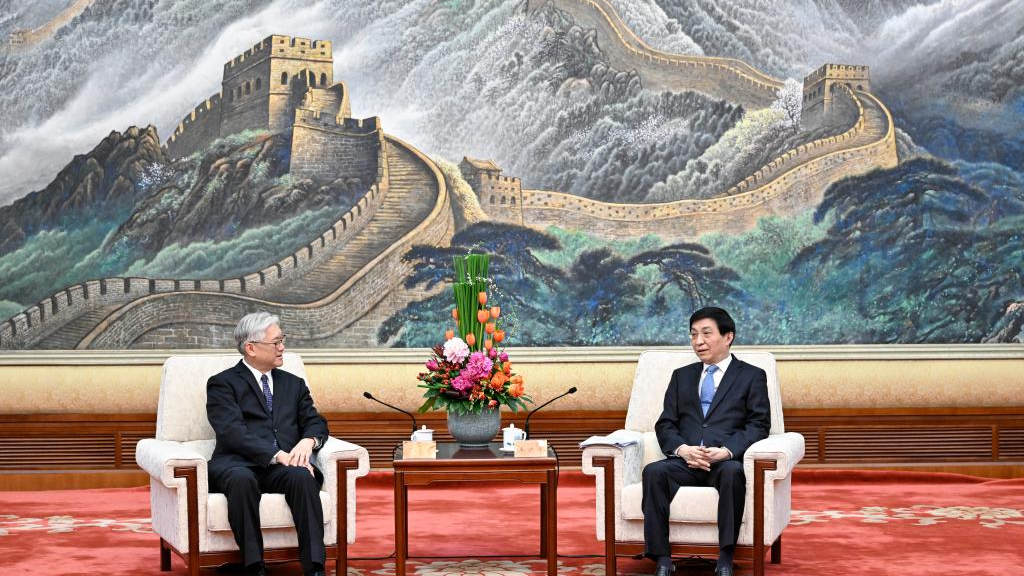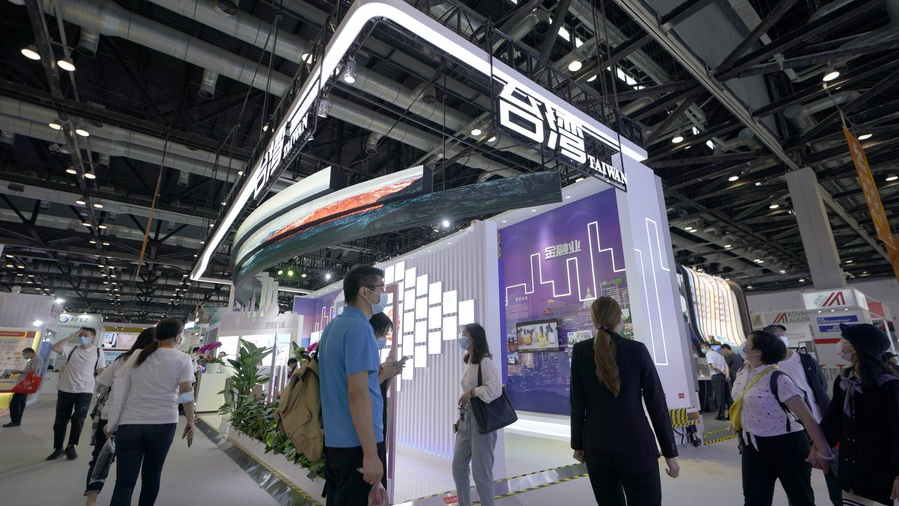
Wang Huning, a member of the Standing Committee of the Political Bureau of the Communist Party of China Central Committee, meets with Andrew Hsia, vice chairman of the Chinese Kuomintang party, in Beijing, capital of China, February 10, 2023. /Xinhua
Wang Huning, a member of the Standing Committee of the Political Bureau of the Communist Party of China Central Committee, meets with Andrew Hsia, vice chairman of the Chinese Kuomintang party, in Beijing, capital of China, February 10, 2023. /Xinhua
Editor's note: Zhang Hua is a research fellow at the Institute of Taiwan Studies, Chinese Academy of Social Sciences. The article reflects the author's opinions and not necessarily the views of CGTN.
On February 8-17, Andrew Hsia, vice chairman of Taiwan's main opposition party the Kuomintang (KMT), visited the Chinese mainland. He hopes to boost political mutual trust between his party and the Communist Party of China (CPC), as well as promote cross-strait people-to-people exchanges, understanding and cooperation, and prevent heightened tension in the region.
Hsia met with government officials, Taiwan studies experts and scholars, along with Taiwan businessmen and compatriots in the mainland. Despite the status of his party being the opposition party in Taiwan, Hsia received high-level treatment during his visit. Hsia met with Wang Huning, member of the Standing Committee of the Political Bureau of the CPC Central Committee, Song Tao, Director of Taiwan Affairs Office of the State Council, and key municipal leaders in Beijing, Shanghai and Chongqing, all related reception protocol at a significantly higher level than his previous visit in August 2022.
Hsia and his delegation held a meeting in Beijing with Taiwan studies experts and scholars to discuss the situation in the Taiwan Strait and other topics, sending a signal to promote cross-strait exchanges. Hsia also visited popular destinations for Taiwan businessmen and compatriots such as Shanghai, Nanjing, Chongqing, and Chengdu to learn more about cross-strait economic, trade, and people-to-people exchanges. He also visited the Sun Yat-sen Mausoleum in Nanjing, saying, "the KMT will not forget its roots."
The trip holds important implications for KMT-CPC relationship and will ensure peace and stability in the Taiwan Strait.
Additionally, the visit of then KMT Chairman Lien Chan to the Chinese mainland in 2005 ushered in a new era in KMT-CPC ties, KMT's fuzzy cross-strait policy and COVID restrictions over the past three years have caused some fault lines over the interaction between the two parties and a rift in political mutual trust.
Hsia reaffirmed that the KMT will respect the 1992 Consensus and to oppose "Taiwan independence." Eric Chu, Taiwan's KMT chairman, also endorsed Hsia's statement and said he would not be complicit with Taiwan region's ruling Democratic Progressive Party (DPP) on matters such as the 1992 Consensus.
Unlike Hsia's visit to the mainland in August 2022, there were no dissenting views within the KMT for his trip this time. The positive manifestations have laid a favorable foundation for the two parties to deepen political mutual trust, a cornerstone for maintaining peace and stability in the Taiwan Strait.
Accordingly, Hsia's visit demonstrated KMT's position of supporting cross-strait interaction and to stand together with Taiwan compatriots while exerting pressure on DPP authorities to adjust their cross-strait policy and normalize cross-strait exchanges. Both the root and impetus of the development of cross-strait relations are from the people. With the resumption of cross-strait people-to-people exchanges, cross-strait relations will also improve.

People visit the booth of China's Taiwan region during the China International Fair for Trade in Services in Beijing, capital of China, September 5, 2021. /Xinhua
People visit the booth of China's Taiwan region during the China International Fair for Trade in Services in Beijing, capital of China, September 5, 2021. /Xinhua
And in recent years, the current Taiwan authorities refuse to recognize the 1992 Consensus, manipulate the anti-China sentiment in Taiwan, and collude with external forces to aggravate cross-strait tensions. Consequently, the People's Liberation Army had to increase its military deterrence against "Taiwan independence."
The results of Taiwan's "nine-in-one" elections in November 2022 demonstrated that peace and development remained the basic propositions of people in Taiwan in regards to cross-strait relations. Hsia's visit was supported by the people. It will help defuse mainland people's concern over the rampant "Taiwan independence" forces in Taiwan, and cool down hostility between the publics across the strait. The KMT also benefited from Hsia's visit, with 78 percent of the Taiwan public believing that it would help the KMT in the next election.
Meanwhile, interference by the DPP authorities and external forces such as the U.S. should not be underestimated. On the matter of the trip of Hsia and his delegation, Taiwan's Mainland Affairs Council issued a statement that deliberately distorted the significance over the interaction between the two parties.
Lai Ching-te, the new DPP chairman, said he would stick to the "Four Musts" proposed by Tsai Ing-wen, and deceived the people in Taiwan and the international community with "unchanged sincerity and unchanged goodwill."
When Hsia returned to Taiwan, several radical "Taiwan independence" activists staged a protest at the airport. A few days ago, the U.S. Deputy Assistant Secretary of Defense Michael Chase visited Taiwan, and there were also rumors that the heads of Taiwan's foreign affairs and security sectors would visit the U.S. soon, which can be seen as evidence for Taiwan authorities' collusion with Washington to undermine the KMT-CPC relationship and peace in the Taiwan Strait.
Nonetheless, no matter how the "Taiwan independence" forces maneuver and how external forces use Taiwan as a pawn, it's difficult to change the growing resentment of the Taiwan public opinion against "resist Chinese mainland, protect Taiwan" and the basic attitude of the people in supporting Hsia's visit. As long as people with insight on both sides of the Taiwan Strait strengthen cooperation, the well-being of compatriots on both sides of the Taiwan Strait can be enhanced, and the peace and stability of the region can be maintained.
(If you want to contribute and have specific expertise, please contact us at opinions@cgtn.com. Follow @thouse_opinions on Twitter to discover the latest commentaries in the CGTN Opinion Section.)